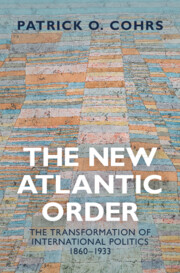Book contents
- The New Atlantic Order
- The New Atlantic Order
- Copyright page
- Dedication
- Contents
- Acknowledgements
- Abbreviations
- Maps
- Introduction
- Part I Inevitable Descent into the Abyss?
- Part II The Greatest War – and No Peace without Victory
- Part III Reorientations and Incipient Learning Processes
- Part IV No Pax Atlantica
- Epilogue The Political Consequences of the Peace
- Bibliography
- Index
Introduction
Published online by Cambridge University Press: 22 April 2022
- The New Atlantic Order
- The New Atlantic Order
- Copyright page
- Dedication
- Contents
- Acknowledgements
- Abbreviations
- Maps
- Introduction
- Part I Inevitable Descent into the Abyss?
- Part II The Greatest War – and No Peace without Victory
- Part III Reorientations and Incipient Learning Processes
- Part IV No Pax Atlantica
- Epilogue The Political Consequences of the Peace
- Bibliography
- Index
Summary
This book seeks to shed new light on a fundamental question – the question of why no durable international order could be created after the First World War – for Europe and for the wider world. And it argues that this requires reappraising a no less fundamental question: why it proved so extremely difficult, and ultimately impossible, to lay the groundwork for a legitimate peace in the aftermath of a war that became the formative catastrophe of the “long” twentieth century, which began around 1860 and has reached its end around 2020. As the following analysis aims to show, to provide new and hopefully more illuminating answers to these questions it is crucial to explore as comprehensively as possible how the protagonists of post–First World War peacemaking dealt with the most profound and indeed pivotal challenge that arose during the war and became acute in its aftermath – and which has not been fully understood. It was the challenge to supersede the still Eurocentric world “order” of the age of imperialism – or rather: the war-prone “disorder” to which it had degenerated by 1914 – and to lay foundations for something unprecedented: a new international system that could no longer be European-dominated, and could not yet be global, but had to be essentially transatlantic. In short, the core theme of this book is that at the heart of the search for a new global order after the First World War, which reached a first highpoint but did not end in 1919, lay the first and in crucial respects unsuccessful attempt to found a new Atlantic order. Yet what ensued had far-reaching global implications. In many ways, it indeed turned into a struggle over the terms and rules of an Atlantic world order for the long twentieth century.
- Type
- Chapter
- Information
- The New Atlantic OrderThe Transformation of International Politics, 1860–1933, pp. 1 - 40Publisher: Cambridge University PressPrint publication year: 2022

